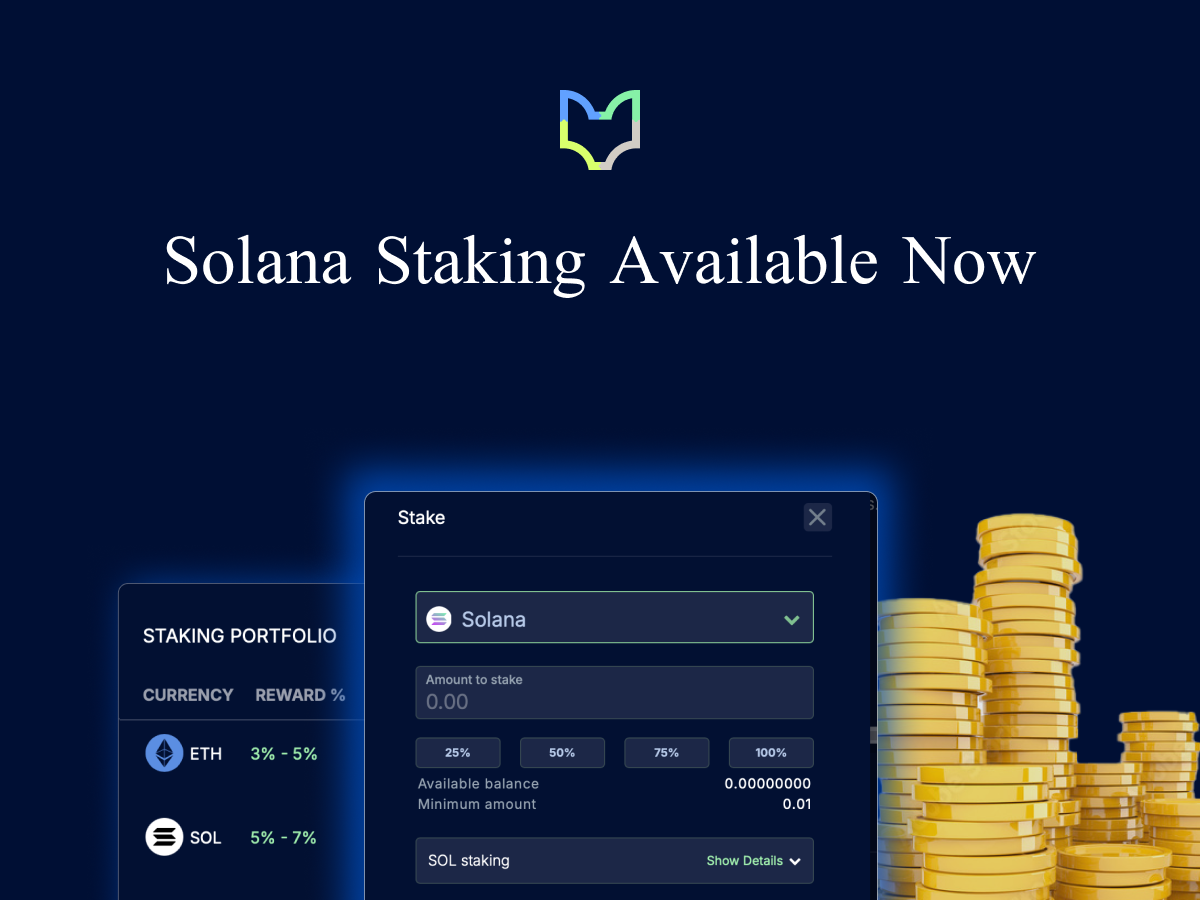This year, Ethereum’s price has dropped from a high of $1,374 per ETH to $233 — a whopping 83% loss.
One of the major targets of speculation in the Ethereum ecosystem is the potential of Ethereum’s smart contract technology. So, if you want to understand the highs and lows of ETH’s price, you need to understand which smart contracts are driving that ecosystem right now.
What are smart contracts meant to do — and are they doing it yet?
The promise of Ethereum was to create a blockchain-based platform for decentralized applications, a so-called “world computer” where anyone could deploy a snippet of code — or smart contract — to the platform and have it self-execute forever.
A smart contract is essentially a contract that can be deployed to a blockchain and is enforced by code rather than people. Just as the blockchain allows you to store, send, and receive digital assets, a smart contract allows snippets of code to transfer value to other contracts or people.
As the cryptographer Nick Szabo outlined in a 1996 paper:
The basic idea of smart contracts is that many kinds of contractual clauses (such as liens, bonding, delineation of property rights, etc.) can be embedded in the hardware and software we deal with, in such a way as to make breach of contract expensive (if desired, sometimes prohibitively so) for the breacher.
With a smart contract, you can theoretically do everything, from underwriting and enforcing a loan to creating a prediction market. The hype and meteoric rise of Ethereum are in large part due to the promise of smart contracts to create a decentralized platform for computing.
Three years after Ethereum’s launch, it’s worth looking into whether and how that promise is actually being realized. We analyzed the data behind 10 of the highest-transacting smart contracts on Ethereum’s platform to answer these exact questions.
The analysis in this article was performed using a Jupyter Notebook to query Google’s public Ethereum dataset hosted on BigQuery. The data is current up to 9/24/18.
Top 10 Smart Contract Addresses by # of Transactions
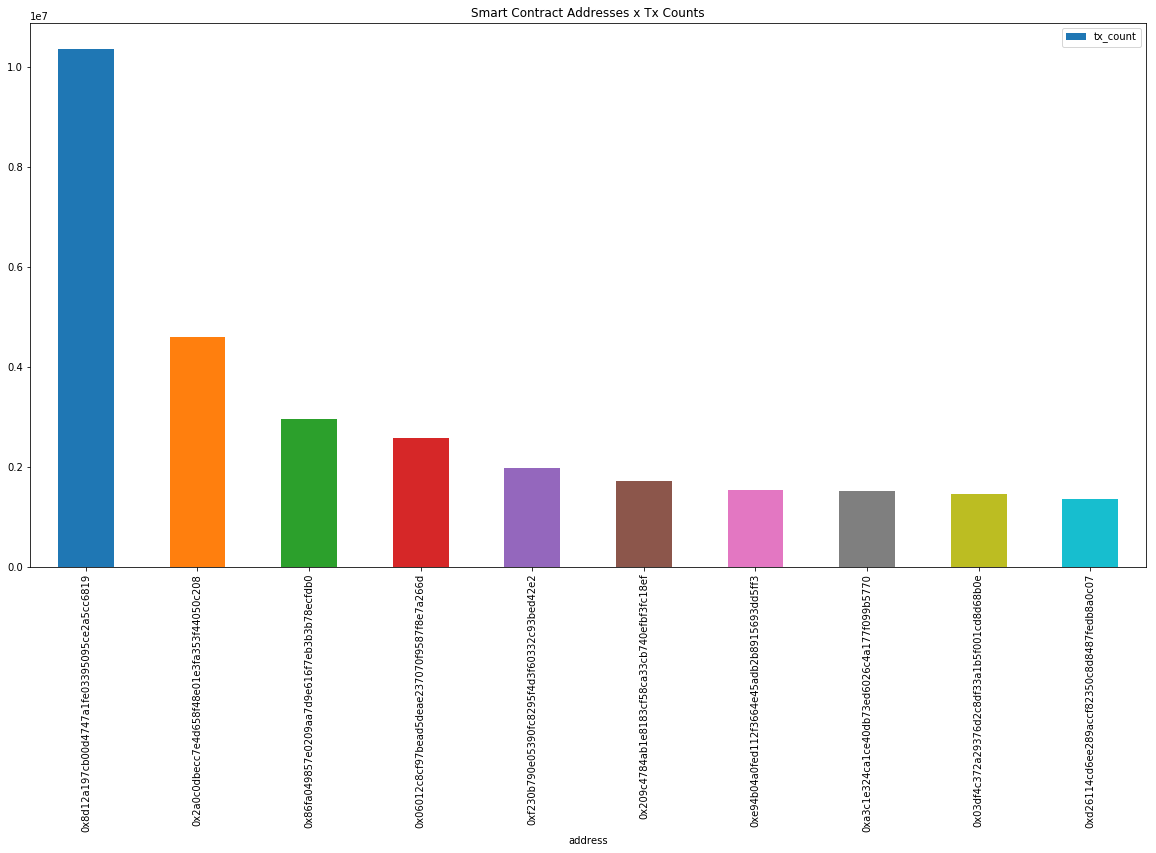
The graph above shows the top 10 Ethereum contracts by the number of transactions associated with each address. There’s an average of 2,998,533 transactions per address. The contract with the highest number of transactions was created by EtherDelta, a decentralized exchange for trading Ethereum and ERC-20 tokens.
The following table shows the addresses and transaction counts for each contract:
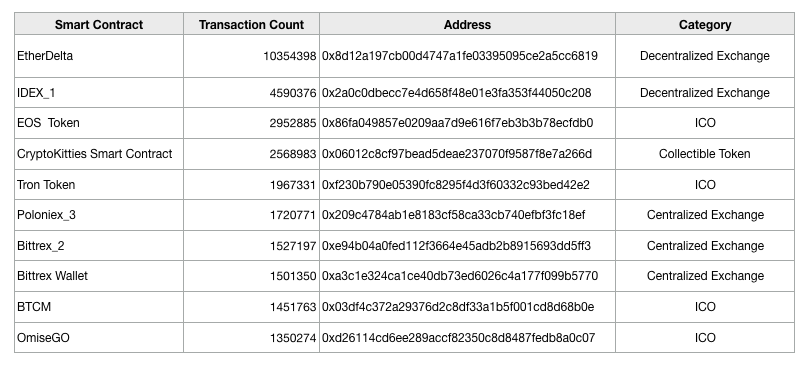
The top 10 contracts fell into the following four categories:
- Decentralized exchanges: Exchanges that allow users to buy and sell crypto assets with their own private keys, without going through a central intermediary.
- Centralized exchanges: Exchanges that hold user funds directly, such as Bittrex or Poloniex.
- ICOs [ERC-20 contracts]: Tokens compliant with the ERC-20 token standard — e.g., EOS and Tron.
- Collectible Tokens [ERC-721 contracts]: Non-fungible (or collectible) tokens compliant with the ERC-721 token standard, such as CryptoKitties.
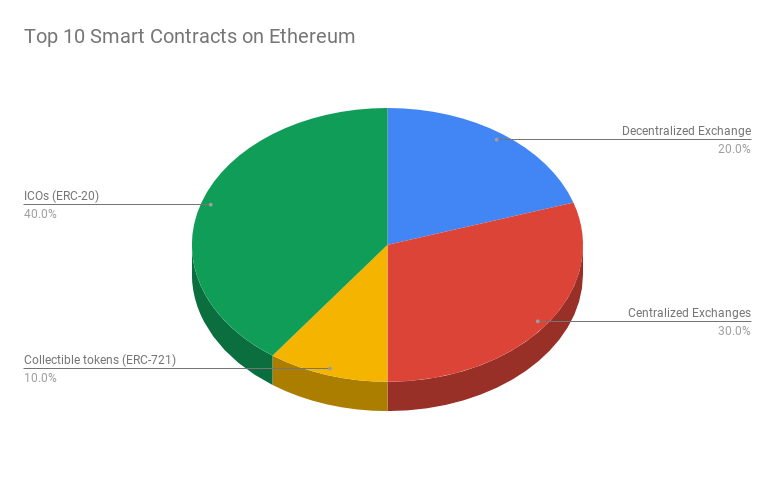
This shows that usage of Ethereum smart contracts remains typically constricted to exchanging ether, Ethereum-based tokens on exchanges, and creating ERC-20 and ERC-721 tokens. The more speculative uses of smart contracts, such as prediction markets or buying and selling real estate, have yet to hit significant mainstream usage.
In the rest of this article, we’ll dig into each of the top 10 contracts in more detail.
A note on the data: We looked at the 10 individual contracts with the highest transaction count on the Ethereum network. Many services and Dapps use multiple smart contracts. For this article, we looked at transaction counts for individual contracts rather than aggregate figures.
1. EtherDelta
The EtherDelta smart contract shows 10,354,398 transactions, the highest number for any single smart contract on the Ethereum Blockchain.
EtherDelta is a fully decentralized exchange for trading Ethereum and ERC-20 tokens. That means that EtherDelta operates without a centralized administrator that holds onto funds.
The EtherDelta smart contract is programmed in Solidity and provides basic exchange functionality, with business logic that is defined and executed in the smart contract. The smart contract allows users to deposit and withdraw Ether and ERC-20 tokens. When a user creates a new order, the order is sent to an off-chain server. When a counterparty trades the order, they send a transaction to the smart contract. The smart contract checks the counterparty’s balance to make sure they have the funds to fill the trade and then executes the trade, moving funds between accounts.
- Transaction count: 10,354,398
- Contract balance: 25,259.9 ETH
You can check out the EtherDelta smart contract on Etherscan.
2. IDEX
Like EtherDelta, IDEX is a popular decentralized exchange. Its smart contract has 4,590,376 transactions, offering real-time trading and high-transaction throughput with support for over 200 tokens.
IDEX relies on its own infrastructure to handle off-chain messaging and state updates. This allows users to trade instantly while their transactions are sent to the Ethereum network through IDEX’s smart contracts.
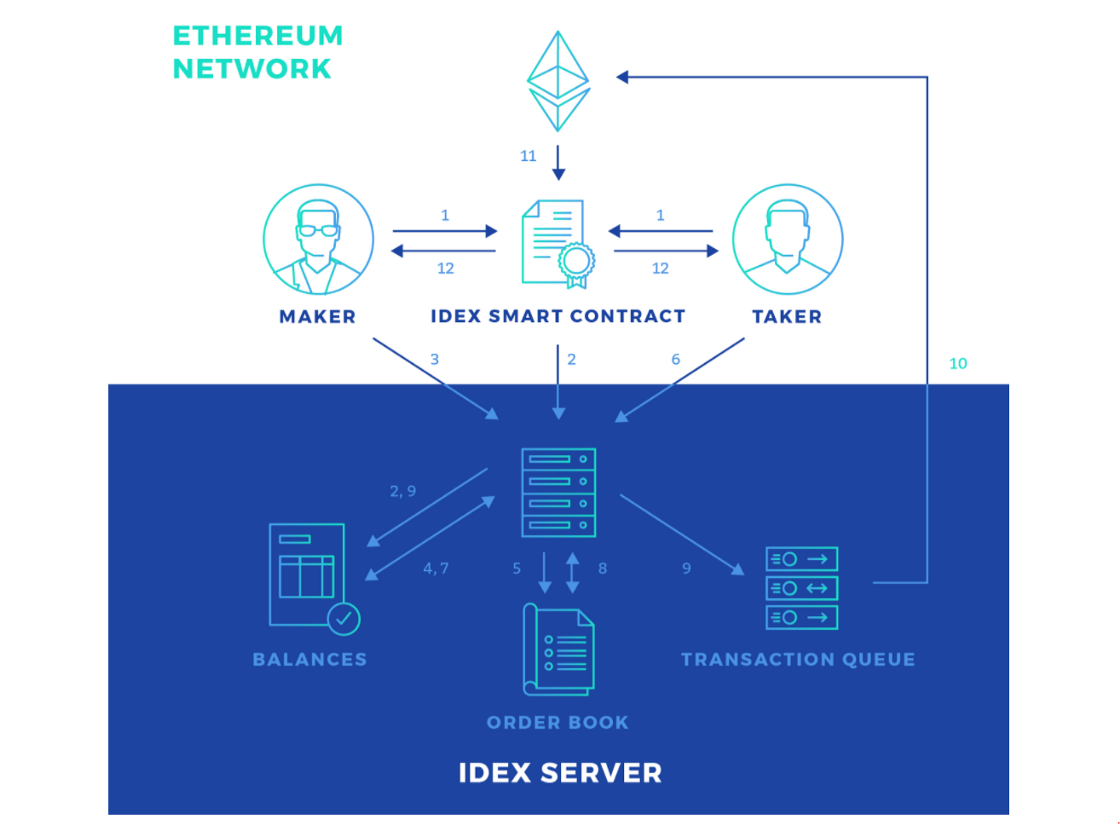
- Transaction count: 4,590,376
- Contract balance: 45,786 ETH
You can check out the IDEX smart contract on Etherscan.
3. EOS
EOS is a cryptocurrency and smart contract platform that wants to compete with Ethereum. To promote distribution of EOS, the developers distributed one billion of the tokens as ERC-20 tokens through a token sale, which could be redeemed for EOS when the cryptocurrency launched this past June.
This specific smart contract was used to facilitate the EOS token sale.
- Transaction count: 2,952,885
- Contract balance: 0
You can check out the EOS token contract on Etherscan.
4. CryptoKitties
CryptoKitties is an Ethereum-based platform for trading, collecting, and breeding digital cats. Each cat takes the form of a unique, non-fungible token that lives in perpetuity on the Ethereum blockchain. That means that when you buy a cat on Cryptokitties, you actually own the cat with your private key: no centralized intermediary can duplicate or take that cat away from you.
All of this is facilitated through the CryptoKitties smart contract, which contains the ability to generate these ERC-721 tokens and trade them.
- Transaction count: 2,568,983
- Contract balance: 252 Eth
You can check out the CryptoKitties smart contract here.
5. Tron
Tron is a cryptocurrency that wants to build infrastructure for a decentralized internet. It focuses on high throughput, scalability, and availability.
The Tron token contract facilitated Tron’s initial ICO, allowing users to purchase ERC-20 tokens representing Tron on the Ethereum network. When Tron launched, those ERC-20 tokens were burned in exchange for Tron.
- Transaction count: 1,967,331
- ETH balance: 0
You can check out the Tron smart contract here.
6. Poloniex
Poloniex is a centralized exchange and the 28th largest exchange by volume, according to CoinMarketCap. Poloniex is based in Delaware and allows trading for over 100 different cryptocurrencies.
The Poloniex smart contract is used to help the exchange manage user funds and transfer ERC-20 tokens.
- Transaction count: 1,720,771
- ETH balance: 0
You can check out the Poloniex smart contract here.
7. & 8. Bittrex
Bittrex is a centralized exchange and was developed by former security professionals at Microsoft. According to CoinMarketCap, it’s the 29th largest exchange by trading volume and supports trading for 284 different cryptocurrencies.
Two of Bittrex’s smart contracts are included in this list of the 10 smart contracts with the highest transaction volumes. The first contract helps move funds between accounts, and the second supports ERC-20 token transactions.
Bittrex 1:
- Transaction count: 1,501,350
- ETH balance: 0
Bittrex:
- Transaction count: 1,527,197
- ETH balance: 0
You can check out the Bittrex smart contracts here and here.
9. Bitcoinereum
Bitcoinereum is a minable ERC-20 token contract on the Ethereum blockchain. Bitcoinereum allows users to mine its ERC-20 tokens and uses a smart contract to run on the Ethereum chain.
The smart contract is used to deliver mining rewards to address holders.
- Transaction count: 1,451,763
- ETH balance: 0
You can check out the BTCM smart contract here.
10. OmiseGO
OmiseGO is an ERC-20 token on the Ethereum blockchain that is intended to provide open financial services through both blockchain-based technology and traditional financial services. It’s run by the company of the same name, which is based in Bangkok.
The OmiseGO smart contract was used to create and distribute ERC-20 tokens as part of a crowdsale that raised over $25 million.
- Transaction count: 1,350,274
- ETH balance: 0
You can check out the OmiseGO smart contract here.
The State of Smart Contracts on Ethereum
While smart contracts are a powerful tool that has the potential to change the world of finance, the technology is still early. The Ethereum network has scaling issues, making it expensive to execute smart contracts in times of high network congestion. Meanwhile, developers have to be mindful of a number of security issues that can lead to costly failures.
While Ethereum was launched with the promise of making it easy to code, deploy, and execute smart contracts that can do virtually anything, it’s clear that we still have a ways to go.
The above references an opinion and is for informational purposes only. It is not intended as and does not constitute investment advice, and is not an offer to buy or sell or a solicitation of an offer to buy or sell any cryptocurrency, security, product, service or investment. Seek a duly licensed professional for investment advice. The information provided here or in any communication containing a link to this site is not intended for distribution to, or use by, any person or entity in any jurisdiction or country where such distribution or use would be contrary to law or regulation or which would subject SFOX, Inc. or its affiliates to any registration requirement within such jurisdiction or country. Neither the information, nor any opinion contained in this site constitutes a solicitation or offer by SFOX, Inc. or its affiliates to buy or sell any cryptocurrencies, securities, futures, options or other financial instruments or provide any investment advice or service.


